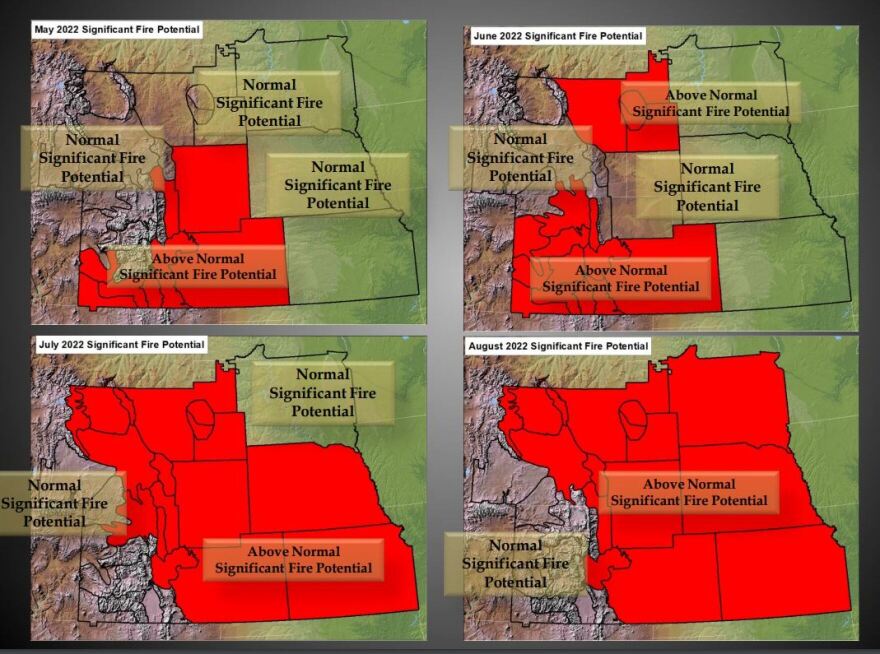Coloradans are on edge as climate change is fueling bigger, more destructive fires that are destroying entire neighborhoods and forcing evacuations all sound the state. Some forecasters say things could get worse this summer than they’ve ever been.
Meteorologist Coleen Haskell says the grim fire forecast for this summer has been years in the making.
"There were two years in a row where we didn't have any monsoonal moisture and those were 2019 and 2020. So that really set the stage for us to have longer-term drought in the state of Colorado," she said this month.
Haskell is a meteorologist for the Rocky Mountain Coordination Center in Lakewood. She releases a report every spring predicting how bad fire conditions will get in the Mountain West in the summer. And this year, it’s as bleak as it’s ever been.
"We're going to be fighting fire very actively," she warned. "The other thing is that we are competing for resources with other geographic areas because there simply is not enough to go around."

Haskell says fire activity this spring has already been unprecedented.
"We no longer have fire seasons, we have fire years," she said. "Already we are off to the races on the eastern side of the Continental Divide. In April we saw 19 consecutive days of red flag warnings in Colorado. And that's just unheard of."
And that wind is having another sinister effect. It dries out grasses and other vegetation fires like to rip through. Haskell says a La Niña climate pattern is to blame for it. It keeps storms tracking north, and the wind behind them roaring through Colorado. And as it fuels fires, forces evacuations, and worsens this summer’s forecast, lawmakers are sounding the alarm.
"There's no question we are living through the earliest stages of the climate change crisis right now," Senate President Steve Fenberg, D-Boulder, said last month. "We are not going to sit back and watch our state go up in flames, our communities devastated, our neighbors losing everything that they have."
Fenberg helped pass a bill this year to force insurance companies to pay more to people who do lose their homes. He's also leading efforts to create a government office focusing on preparing cities for wildfires. He says Colorado will spend $20 million just to get the state ready for them this summer.
"We will have new tech systems for on the ground firefighting coordination that we have never been able to have before, especially in some of these remote areas where these fires start," he said.
The new arsenal includes a smartphone application that connects firefighters to surveillance aircraft, and a brand new helicopter called a firehawk. It’s military grade and can carry much more water than older helicopters Colorado has been using. Lawmakers spent $34 million last year to order it.
But other parts of the plan are still in the works. That includes a new network of cameras around the state to quickly detect new fires. California already has more than 1,000 of the cameras. Neil Driscoll manages the camera network from the University of California in San Diego. He told lawmakers they are a game-changer.
"What used to take maybe 30 minutes to confirm a fire by sending in an engine or an aircraft now takes minutes," he said.
Colorado was planning spend $2 million this year to test out the cameras. But sponsors said they could not find the money and the bill died last week. Back at the forecasting office in Lakewood, meteorologist Coleen Haskell said she is getting new tools.
"We're combining now the National Weather Service gridded forecast out to seven days where before we were only getting one day," she said. "So they've done a lot of work to get all of that integrated into fire danger in the fire environment where we can make better predictions out further in time."

She said forecasters are also having to get more creative about how they warn the public because the red flag days are coming so often, people might be tempted to tune out the forecast.
"I tell people, ‘listen, you need to eat your Wheaties today.'," Haskell said. "I know that's not scientific, but it hits them. They're like, 'OK, this is going to be a day that we you know, if the hair on the back of your neck is standing up, you need to pay attention to that and figure out why.' "



